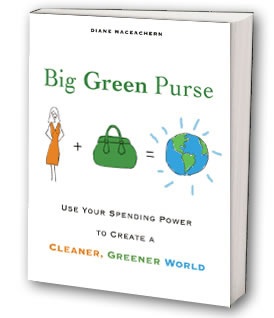More of the Big Green Purse Interview (Part 2)
Following is Part 2 of OrganicMania’s interview with Diane MacEachern, author of the new eco-best seller Big Green Purse. Part 1 is here.
Big Green Purse aims to inspire women to use their collective purchasing power to “create a cleaner, greener world.” Did you realize that simply by buying more green products, we encourage business to produce more green products? And of course, it’s not all about buying…it’s about reducing, reusing and recycling too.
OrganicMania: In the book, you provide an overview of many of the third party seals and certifications available for green and organic products. It can really be overwhelming. People are just getting used to the USDA Organic seal, and now they’re being asked to learn about the Green Seal, the VeriFlora label, Certified Humane Raised & Handled, the SMaRT Sustainable Standard, and at least nine other seals. On top of that, they need to sort out all the bogus “natural” and “organic” claims. Do you think there is true value in having so many seals?
Diane MacEachern: I do think it’s best defined, so that it’s not brand specific, but product specific. With regard to organics, companies are forbidden by law to claim they’re organic if they’re not. But there is a loophole. For example, they can say on their label that they have used organic lime juice or organic lemons and they can get away with implying that the product is organic. There is a very strict rule about how much of the product has to actually be organic in order to use the USDA Organic seal. But companies can include organic ingredients in their products and imply that the entire product is organic. The consumer may think the product is truly organic, but if it doesn’t have that seal, it’s not organic. This is one of those things that is so annoying and that undermines organic credibility in the marketplace.
(Editor’s Note: For an example of one of these “implied organic products, read this post.)
The best organic products have the Fair Trade seal and the Organic seal. And with coffee, chances are that if you see both these seals, it’s likely shade grown as well.
OrganicMania: Let’s talk about the role of environmental contaminants and health, particularly the impact of chemical ingredients in common household products and personal care products. You write about that extensively. Do you think that the US government will ever change the way it regulates chemicals, from looking at each ingredient separately, as it does now, to looking at interactions between various chemicals? I imagine it would be very complex to do.
Diane MacEachern: None of the presidential candidates are talking about human health impacts of the environment. It’s going to be tough. I think the best thing to do for now is to choose products with the fewest number of ingredients. That gives you a greater chance that you’ll be protected.
OrganicMania: This makes me think of the Precautionary Principle you discuss at length in your book. It’s something that I think a lot of us mothers believe intuitively, but may have no idea that there is literally something called the Precautionary Principle. Can you explain the Precautionary Principle?
Diane MacEachern: The Precautionary Principle was hammered out in 1998 by a conference of scientists, researchers, and citizens. They were concerned that industry was using the lack of absolute scientific evidence as a cover to produce products suspected of having serious health and environmental consequences.
The principle is grounded in the belief that we should not wait to protect ourselves or the planet until we’re absolutely positive, from a scientific point of view, that certain products or activities – think dioxin, the burning of fossil fuels, or even cigarettes – can indeed do damage.
The principle declares, “When an activity raises threats of harm to human health or the environment, precautionary measures should be taken, even if some cause-and-effect relationships are not fully established scientifically.”
OrganicMania: Thanks so much, Diane. It’s been great hearing your thoughts and getting more insight into your terrific book. And it’s so exciting to see so many women coming together to work on issues surrounding the environment and our health.
Diane MacEachern: Yes, it is exciting. Mary Hunt, the author of “In Women We Trust,” talks about how women are grouping to save the world. Women are using blogs to carve our thoughts into the Internet wall. ‘I was here and this is what I think.’
Copyright 2008 OrganicMania
Filed under Green Ideas & Stuff, Interviews, Organic Mommypreneurs, Organics | Wordpress Comments (5) |Interview with Big Green Purse Author Diane MacEachern
If you’re anything like me, your list of “must read” books is longer than your list of “recently read” books! Prior to interviewing Diane MacEachern, author of the new eco-handbook Big Green Purse, I admitted that I might not make it through the entire book prior to speaking with her.
As the author confessed to OrganicMania, “None of us have any time! It’s hard to concentrate and read. The book is intentionally designed so that if don’t need to read the whole book, you can just check out the sections of interest to you.”
Imagine my surprise when a week or so later I had read a great deal of the book, which aims to inspire women to use their collective purchasing power to “create a cleaner, greener world.” Easy-to-read, informative, I could go on and on…but check out this review from EnviroMom.
Following is Part I of OrganicMania’s interview with Diane MacEachern. Check here for Part II.
OrganicMania: Some pundits dismiss women’s interest in the environment as just a passing fad. You’ve been writing about the environment for nearly 30 years now, so you’ve seen interest come and go. Do you think this latest upsurge in interest is a reflective of a real change in people’s priorities, or just the latest cool trend?
Diane MacEachern: I’m very optimistic. We suddenly realize how serious these environmental problems are. I don’t think this is just a trend because we are becoming so educated about the relationship between the environment and human health. It’s not just buying cool organic tee shirts, but it’s women recognizing that they need to buy products without phthalates so that my unborn baby has a healthy life and deodorant without parabens so I don’t get breast cancer. And this only will get stronger as more and more research goes down this path.
Another big issue is air pollution. Women suffer more heart attacks than men because our blood vessels are smaller. We’re more severely impacted by poor air quality. Our children are also suffering from more cases of asthmas because of environmental issues. The only way that will change is to protect the environment, or else we’ll have more heart attacks, more asthma, and more health consequences to every environmental problem that we’re looking at.
OrganicMania: There’s also a perception that this rising green consciousness is a very upper-middle-class phenomenon. There was a lot of sniping about that in the blog chatter about The New York Times article on Eco-moms. I was pleased to see your book included money saving tips, making it seem very accessible, like it was written for Everywoman. Do you see women from all walks of life embracing the green movement? Do you think this is a real shift that will embrace all women?
Diane MacEachern: I’ve been to a lot of bookstores for book readings, and my observation is that there are definitely people there who are interested in this topic who come from all economic levels. There are a lot of upper middle class women who will ask indignantly, “Isn’t this just for wealthy women?” I have two responses to that.
Everybody can do something. You can turn off your lights. Everybody can afford 99 cents for a reusable shopping bag. Anyone can shop at thrift stores. It’s fabulous. We need to dismiss this notion that eco-consciousness is only for wealthy people. Environmental degradation doesn’t affect only wealthy people.
But those who are wealthy do have a responsibility to be to be leaders and early adopters to protect the environment. They can ultimately help to drive down price if they buy these green products until supply and demand really kicks in, and prices decrease. I remember when I bought my first compact fluorescent bulb. It was $25. Today you can buy them for $1.99. I’m proud to be an early adopter, a woman who uses money to make a difference. That’s a really important part of the book.
OrganicMania: Big Green Purse talks quite a bit about the connection between phthalates and early onset puberty, but you don’t write about a possible connection between early onset puberty and hormones in milk. Many people use that possible link as a reason for buying organic milk. Do you disbelieve that?
Diane MacEachern: I didn’t have time to do all the research into the consequences of hormones and milk. I’m going to put that information on the Big Green Purse website, along with information about hormones in meat. The website will constantly refresh the book.
Go here to read Part II of this interview.
Copyright 2008 OrganicMania
Filed under Green Ideas & Stuff, Interviews, Organic Mommypreneurs, Organics, Pregnancy | Wordpress Comments (3) |
 My StumbleUpon Page
My StumbleUpon Page



